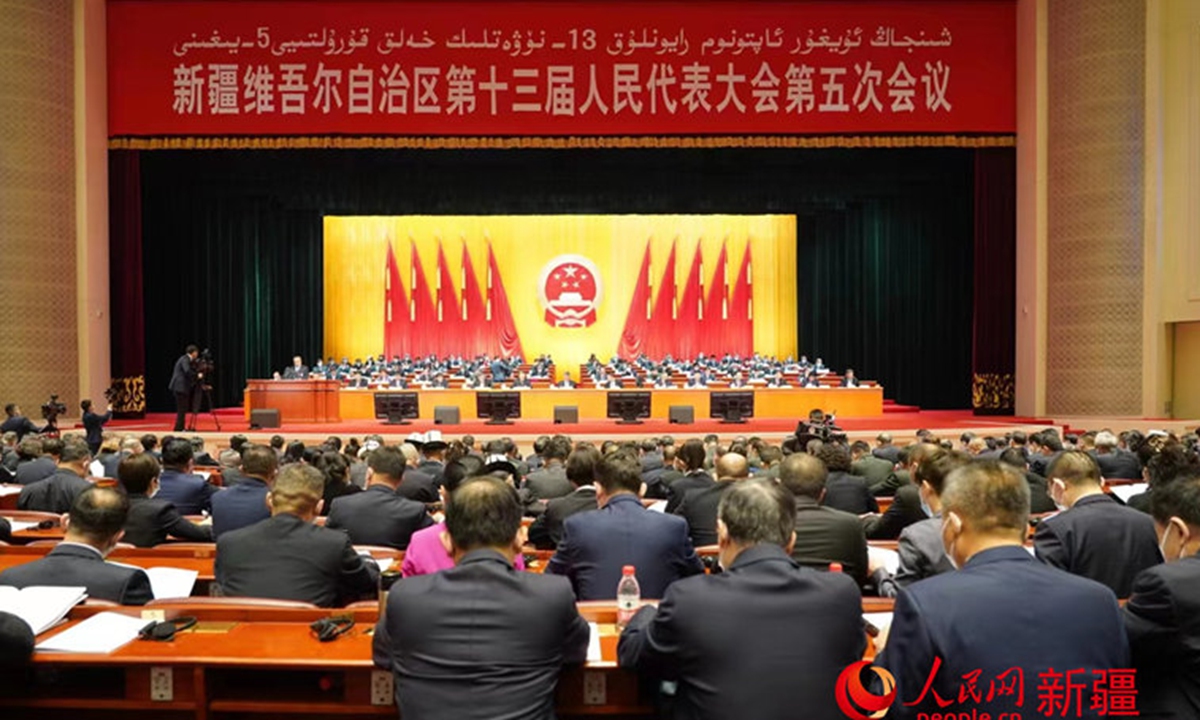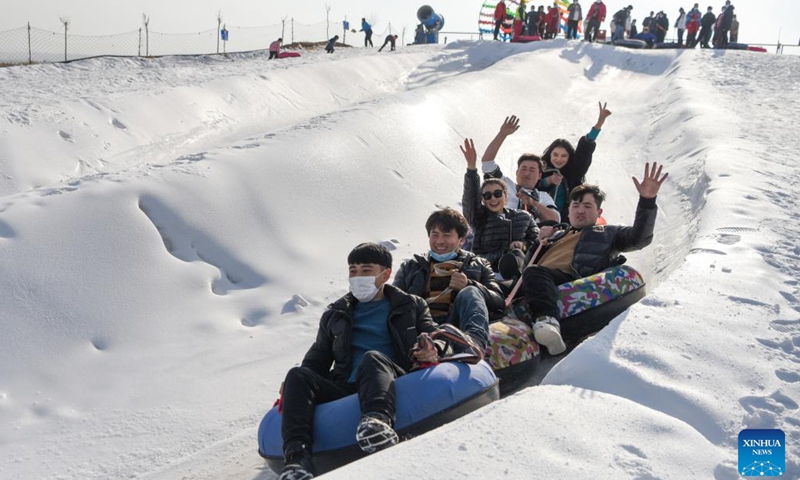Xinjiang economy expands 7% year-on-year to hit 1.6 trillion yuan; no terrorist attacks in 5 years
Region’s stellar performance result of hard-won battle against terrorism, strong counterattack against US crackdown: experts

The fifth session of the 13th People's Congress of the Xinjiang Uygur Autonomous Region opened on January 23, 2022. Photo: People.cn
China's Xinjiang handed in a report of solid achievements in 2021, with its GDP expanding 7 percent year-on-year to about 1.6 trillion yuan ($250 billion) despite the COVID-19 onslaught, and the region has seen no violent terrorist attacks for five consecutive years, the local government work report pointed out during the fifth session of the 13th People's Congress of Xinjiang Uygur Autonomous Region, which kicked off on Sunday.
In the eyes of observers, this resilient performance is the result of the region's hard-won battle of moving past chaos and toward stability, and is also closely linked with China's strong emergence from the COVID-19 impact last year. It also served as solid proof that the region's social and economic development is on a stable track, despite becoming the target of a US crackdown. They also pointed out that under the leadership of the region's new Party chief, the region is moving to a development path that puts more emphasis on high-quality economic growth.
According to the local government work report delivered to the annual session of the regional legislature, which kicked off on Sunday, three drivers of the region's economy - fixed-asset investment, social retail and foreign trade - increased by 15 percent, 17 percent and 5.8 percent respectively. Value-added output of enterprises above a designated size rose to 456 billion yuan, up 8.8 percent on a yearly basis.
The urban unemployment rate was managed to within 5.5 percent, and the region's major indicators have exceeded their annual targets, said the local government.
The report also said that Xinjiang has made all-round efforts to normalize the law-based fight against terrorism and maintain stability, as there have been no cases of violent terror attacks for five years in a row, and the number of criminal and public security incidents have continued to decline.
All these factors have fulfilled people's yearlong desire for peace and stability in Xinjiang. People of all ethnic groups now have a growing sense of security and confidence in social stability and enduring peace, the report said.

Tourists play on snow tubes at Oynak ski resort in Moyu County, northwest China's Xinjiang Uygur Autonomous Region, Jan. 9, 2022. Located on the southern brim of the Taklimakan Desert, Moyu County barely snows in winter. In order to boost its winter tourism and extend the tourism season, the county built Oynak ski resort by making artificial snow, fueling people's passion for winter sports here. (Photo: Xinhua)
Despite the ongoing impact from COVID-19 in 2021, economic and social development that Xinjiang gained last year indicate that the region is heading in an orderly and steady direction, Wang Jiang, a distinguished research fellow at the Institute for Frontier Region of China, Zhejiang Normal University, told the Global Times.
It's a hard-won achievement for Xinjiang's economy. The performance is also in line with the world's second largest economy's robust recovery last year, which registered an 8.1 percent growth, the fastest in a decade, Gao Lingyun, an expert at the Chinese Academy of Social Sciences in Beijing, told the Global Times on Sunday.
Wang said that judging from the current situation, the special period in Xinjiang during which terrorism was rampant is now a thing of the past, as there haven't been terrorist attacks in five years, but that doesn't mean that the measures taken to maintain stability will be stopped. "From law enforcement and from every perspective, [Xinjiang's maintaining of stability] will pursue a more precise and balanced direction."
Wang noted that the next step for the region is to gradually shift its main focus from maintaining stability to further elevating its economic growth, a sign that is also reflected in the region's change of leadership at the end of last year.
Ma Xingrui, who once worked in a university, has experience in aerospace science and served as governor of Guangdong Province, was appointed by the Communist Party of China (CPC) Central Committee as new Party chief of Xinjiang in December, 2021, replacing Chen Quanguo, who held this post since 2016. Chen will be appointed to another post, according to the CPC Central Committee.
Days after he assumed position, Ma made his first tour of the regional capital Urumqi, calling for efforts to modernize the region's supply chains and improve the international business environment.
He also stressed the strategy of bringing prosperity to Xinjiang through tourism, and pushing deep integration of culture and tourism.
Sunday's report said that Xinjiang will try to host 250 million trips in 2022.
Wang pointed out another challenge Xinjiang is facing this year lies in COVID-19 prevention. As one of the regions with the longest borderlines in China, it is not easy for Xinjiang to fend off all imported cases. However, the expert is confident that after accumulating two years' experience, the region is able to control flare-ups without allowing them to have a much wider impact.
Looking forward, Xinjiang has set its GDP growth target for 2022 at around 6 percent and value-added output of enterprises above a designated size up by about 6.5 percent.
Setting growth rate target for 2022 at around 6 percent signifies the regional government's confidence in this year's economic growth based on social stability, since most provinces or municipalities set their targets at the range between 5-5.5 percent, said Gao.
The leadership change in Xinjiang at the end of 2021 also indicated that the region will make more progress and put greater emphasis on economic development in the region, he added.
Futile crackdown from US
Last year, Xinjiang was also the target of a harsh crackdown from Western countries, especially the US, which banned cotton and tomato products from Xinjiang over alleged human rights violations. Last month, the US House of Representatives passed legislation banning imports from China's Xinjiang region over alleged forced labor concern.
Wang said that although the impact of the newly signed bill is yet to be seen, figures on Xinjiang's economic performance last year indicate that the impact of previous crackdowns are very limited.
Last year marked Xinjiang's modern agriculture entering a stage of high-efficiency and high-quality development, with total grain output reaching 17.36 million tons, an increase of 9.62 percent on a yearly basis, hitting a record high for the past five years.
Cotton, a major agricultural product in the region, saw improvements in quality and growth efficiency in 2021, with a total output of 5.13 million tons which accounted for 89.5 percent of the country's total, maintaining its top ranking in China for over two decades in terms of total cotton output, per-unit yield, planting area and commodity allocation.
In the past year, Xinjiang has taken proactive measures to build itself into a core area of the Silk Road Economic Belt. A record number of 12,210 inbound and outbound China-Europe freight trains passed through Xinjiang in 2021, up 21.5 percent year-on-year, data from the local government work report showed.
Gao said the figures indicate that Xinjiang is marching forward on the right track despite certain countries' groundless crackdowns.
"Xinjiang should give full play to its advantageous industries like agricultural products and the photovoltaic industry, combining its own characteristics with the nation's strategic needs in the region, which are bound to have bright prospects in the future," Gao noted.
Photos
Related Stories
- Products from Xinjiang become hot sellers as consumers show support amid Western attacks
- Pic story: captain of ski patrol team in China's Xinjiang
- Bohu county in China's Xinjiang attracts tourists with colorful varieties of activities
- Yutian County in Xinjiang steps up development of labour-intensive industries
- Overseas Chinese, students refute Xinjiang rumors
Copyright © 2022 People's Daily Online. All Rights Reserved.










